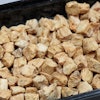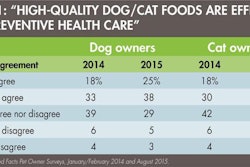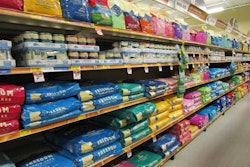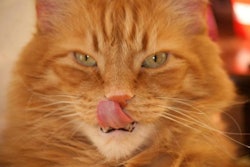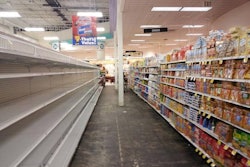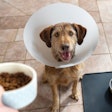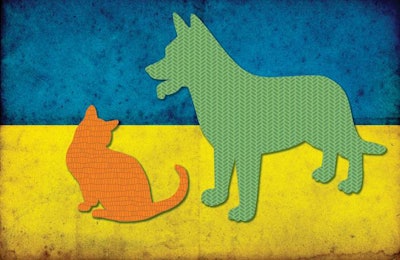
Ukraine’s pet food market is going through some major changes as a result of the Russian annexation of Crimea and warfare at the east regions of the country. The overall volume of pet food sales in Ukraine decreased in 2014 due to the fall of the population’s purchasing power; the situation in the zone of Anti-Terrorist Operations (ATO) is much worse, as product supplies have been largely reduced and nearly 30% of all pet shops have closed.
As a result of the current socioeconomic environment, Kormotech, one of Ukraine’s biggest pet food manufacturers, launched the philanthropic effort, “Don’t Leave Us Alone in ATO,” garnering pet food production for homeless animals in combat zones.
“From November 2014 to January 2015 we managed to collect more than 30 tons of products, two-thirds of which have been handed over to volunteers, owners of mini-shelters, animal protection organizations and breeders in 14 cities and towns in the military conflict area,” said Kormotech’s PR manager Kateryna Kovalyuk. “A third of the stock collected will be provided to the shelters that moved to the front-line area.
“The ‘tasty cargo’ was accumulated by caring Ukrainians in pet stores,” she said. “When buying Kormotech products for their pets, buyers automatically helped the animals in the ATO area, since we channeled 2% to the assistance fund.”
The initiative received wide support among Ukraine pet shop owners and industry representatives. “Our customers often buy food for their pets and for the stray animals that live near the store,” said Olena, a representative of Sheredko Oksana pet shop at the Provesin market in Lviv. “That is, even before the initiative, many people took care of both their own animals and others’, too. But as for those in the ATO area, they didn’t. They like that initiative.
“The customers say there’s no such thing as somebody else’s misery, somebody else’s animals,” said Olena. “Now they have a real opportunity to help. Usually it improves loyalty to our store as a participant in the event and to the organizing manufacturer. This is also driven by a high demand for domestic products, including the Kormotech products.”
The overall market situation, together with this initiative, provided additional impact to so-called consumer patriotism, which improved the position of Kormotech in the domestic market.
In early 2014, the share of Kormotech’s total sales from the Crimea and current ATO markets in Ukraine was 25% (7% and 18%, respectively), according to official company data. The current volume of sales in the Crimea and in the ATO area decreased five and two times, respectively.
“In mid-2015, through the dynamics of sales development and market positioning, Kormotech regained that volume,” said Kovalyuk. “Our advantages included both our pricing policy, as in contrast to multinational companies we raised prices more slowly, and the economic patriotism that has developed among Ukrainians. The initiative ‘Don't Leave Us Alone in ATO’ also made its contribution: the loyalty level of pet shops and their customers to the company and its products has significantly grown.”
This is also supported by AR-Group data, which suggested that the share of Kormotech in the Ukraine pet food market in 2014 was 28% (see Figure 1), which is more than in 2013. The overall market size in 2014 decreased by 3.2% to 89,200 metric tons (see Figure 2). Despite this, Kormotech increased the volume of production by 11.5% compared to 2013, from 22,830 metric tons to 25,460 metric tons (see Figure 3).
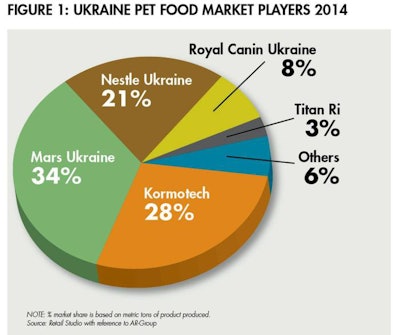
Mars, Nestle and Kormotech collectively hold the majority share—83% in 2014—of the Ukrainian pet food market.
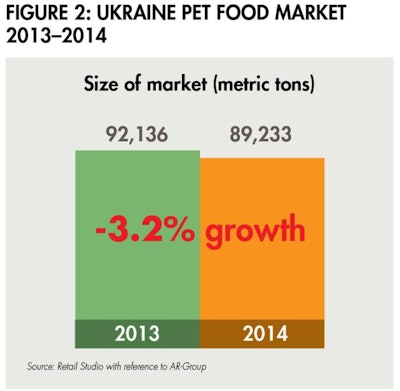
Due partially to regional unrest, Ukraine’s pet food market saw a 3.2% decrease between 2013 and 2014.
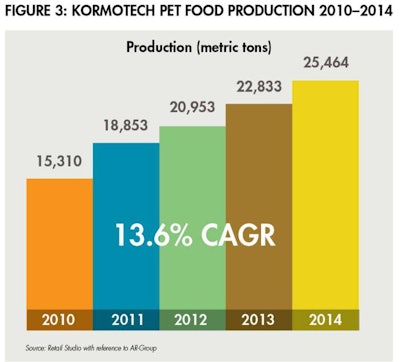
In spite of current challenges, Ukraine’s compound annual growth rate has still been 13.6% for the last four years.
In addition, according to AR-Group, in 2014 Ukraine decreased imports of pet food by 7.2% in natural terms and increased them by 12% in monetary terms, to 69,410 metric tons of the total value–UAH 1.033 billion (US$47.1 million). The main factor contributing to this trend was the devaluation of hryvnia, Ukraine’s currency, which increased the price of imported products in the domestic market. The main importers of pet food to Ukraine in 2014 was Hungary (36%), Russia (24%), France (12%), Poland (8.1%) and the US (5.3%), according to AR-Group data.
Despite the fall of sales in 2014, AR-Group said Ukraine’s CAGR (compound annual growth rate) for the last four years is estimated at 13.6%, causing experts to continue considering Ukraine’s pet food market to be steadily growing.
More on the global pet food industry

